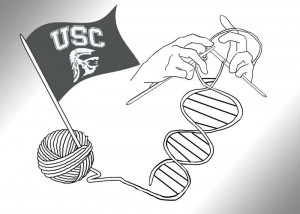Research opportunities at our disposal
Anyone interested in meeting E.T.?
Randolph Hall, vice president of research at USC, announced Tuesday that USC has partnered with the Search for Extraterrestrial Intelligence Institute in Mountain View, Calif.
According to a faculty memo, this affiliation will “enable joint research projects by USC and SETI Institute Scientists, and student internships for USC students.”
This provides incredible new opportunities for USC undergraduates to compete for NASA funding in the field of astrobiology. They might also be able to contribute to Johannes Kepler’s search for inhabitable planets.
Coupled with the recent creation of a committee to expand the neuroscience program, USC continues to advance its reputation as a vanguard research university.
Now if only more undergraduates could utilize the resources available to them.
There is certainly no shortage of university funding and support. Between the USC Provost’s Undergraduate Research Fellowships, the Undergraduate Research Associates Program and Women in Science and Engineering, various major-specific opportunities lie within each school.
As a private research university, USC attracts students that want to apply their skills in labs and classrooms. In fact, students want to start as early and squeeze in as much relevant, hands-on experience as they can.
If both the university and its students desire an increase in undergraduate research, then why is there a disconnect?
Quite simply, students remain daunted by the prospect of taking the initiative. They might not know how to find a laboratory, approach professors with interesting publications or initiate the mentor-student relationship.
And to that end, USC cannot merely continue its well-intentioned yet ineffective attempts at publicizing its platter of research funding opportunities when students remain at a loss for how to create a proposal to begin with.
Currently, few majors have required 490x (Directed Research) classes for their undergraduate degrees, even though almost every department from linguistics to architecture to business offers two-unit 490x classes.
More, if not all, majors at USC should implement a research requirement of at least four units, ensuring a full year of research on a long-term project, but capped at eight units to allow for other areas of study.
As a freshman last semester, I took Introduction to Research Apprenticeship in a molecular biology laboratory that works with the genetics of aging.
The experience not only jumpstarted my interest in research, but also allowed me to learn complex technical skills and to think independently about solving a problem by applying textbook theory.
Through research, I have learned to not be discouraged by setbacks but to re-engage the problem with a different approach or new perspective.
I have only heard similar sentiments among others in the program, best exemplified at the end-of-semester symposium where students enthusiastically present their research findings. Some of my fellow students even claimed to have finally found their passions.
Faculty-directed undergraduate research allows students to gain hands-on experience with innovation and to find real-world applications of rote textbook material.
According to a report by the Education Commission of the States, Making Quality Count, undergraduate research ranked as the most effective method for “active learning,” “integrating education and experience” and “ongoing practice of learned skills.”
The study also rated undergraduate research as the best for “out-of-class contact with faculty.”
Developing a mentor relationship with a faculty member will not only guide students through their undergraduate years at USC, but could help clarify career paths and realize the personal demands of their professions of interest.
And, of course, experience with research as an undergraduate provides students a competitive advantage when they apply to graduate schools.
As students advance through a research program, their projects become more difficult, so it becomes much easier to transition from upper-level to graduate student-level research.
After all, someone has to create the next nanotechnology circuitry or synthetic organism. Why not a USC student?
Rebecca Gao is a freshman majoring in global health and biological sciences. Her column, “Trojan Grounds,” runs Mondays.

